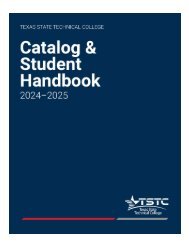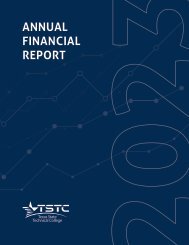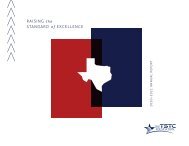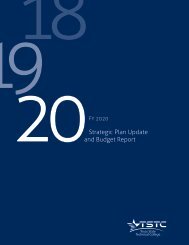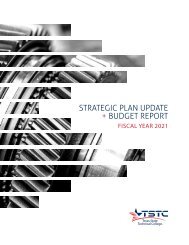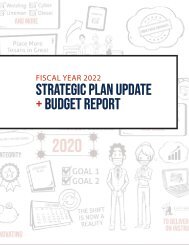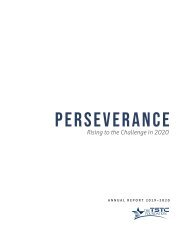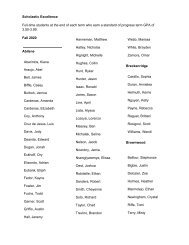You also want an ePaper? Increase the reach of your titles
YUMPU automatically turns print PDFs into web optimized ePapers that Google loves.
APPROVED 08/18/2022<br />
A.<br />
B.<br />
C.<br />
D.<br />
E.<br />
F.<br />
G.<br />
H.<br />
I.<br />
J.<br />
K.<br />
<strong>FY23</strong> appropriation revenues were determined in the 87th regular legislative session<br />
through the General Appropriations Act, which was finalized in May 2021. Debt Service<br />
appropriations decrease in <strong>FY23</strong> as twenty-year bonds issued in 2002 were paid in full the<br />
prior year.<br />
Tuition revenue saw a strong improvement in FY22 as TSTC’s enrollment rebounded from the<br />
p<strong>and</strong>emic dip. The <strong>FY23</strong> tuition revenue budget increases approximately 5% over FY22, as<br />
the positive momentum in enrollment is expected to continue.<br />
Student Financial Aid revenue <strong>and</strong> expense, both saw big increases in FY22 as a result of<br />
CARES Act federal aid going directly to students. That aid is mostly exhausted <strong>and</strong> slight<br />
increases in these categories, compared to prior “normal” years, correlate to expected<br />
increases in enrollment <strong>and</strong> tuition.<br />
Supplemental sources of revenue were hit hardest by the p<strong>and</strong>emic, as many auxiliary<br />
operations <strong>and</strong> industry relations activities went significantly dormant. Revenue projections<br />
for these categories in <strong>FY23</strong> are mostly conservative, as long-term impacts from the<br />
p<strong>and</strong>emic to these operations are still unknown.<br />
Grants revenue, as well as Grants expense, have seen major increases <strong>and</strong> changes the last<br />
few years as a result of CARES Act funding. A majority of this funding was expended in FY21<br />
<strong>and</strong> FY22, but supply chain issues <strong>and</strong> other external factors will push the remaining revenue<br />
<strong>and</strong> related expenditures into <strong>FY23</strong>.<br />
TSTC routinely utilizes accumulated reserves for various purposes. In FY21, $5.9 million of<br />
CARES Act lost revenue funds were deposited into reserves to be used in future years. In<br />
FY22, $5.5 million of reserves were utilized for early debt retirements, as well as to fund<br />
scholarships from accumulated balances in restricted funds. In <strong>FY23</strong>, TSTC plans to use<br />
reserves of approximately $5 million to balance the operating budget.<br />
Expense budgets for the primary operating divisions of the College are generally elevated<br />
compared to prior years. As competitive salaries are increasing nationwide <strong>and</strong> inflation has<br />
begun to materially impact operating costs, budgets must increase for TSTC to continue to<br />
deliver high quality technical training while also improving employee pay where possible.<br />
The expense budget for the Instructional division of the College continues to increase year<br />
over year, although FY22 forecasted actual expenses are higher than the <strong>FY23</strong> budget. This<br />
variance is the result of an early retirement of debt related to equipment purchases for the<br />
Fort Bend <strong>and</strong> North Texas campuses. The entire balance of the debt of $4.2 million was paid<br />
off in FY22, which frees up approximately $2 million annually in future budgets for other<br />
instructional initiatives. Also, FY22 forecasted expenses <strong>and</strong> the <strong>FY23</strong> budget each include a<br />
$1.8 million payment as a part of a three-year aircraft fleet replacement program.<br />
In an effort to improve facilities <strong>and</strong> maintain a higher st<strong>and</strong>ard of quality for the look <strong>and</strong><br />
feel of its campuses, TSTC is investing an additional $4.5 million per year (beginning in <strong>FY23</strong>)<br />
to address deferred maintenance <strong>and</strong> allow for scheduled equipment upgrades.<br />
As mentioned in Note F, TSTC retired various outst<strong>and</strong>ing debts in FY22, including lease<br />
purchases at Fort Bend <strong>and</strong> Marshall. Also, in March 2022, certain bonds were refunded to<br />
take advantage of lower interest rates. As a result, the total debt service budget in <strong>FY23</strong> is<br />
$1.3 million lower than FY22.<br />
TSTC utilizes a strategic pool each year to respond to rapid changes in operations <strong>and</strong><br />
allocate budget increases throughout the year. For <strong>FY23</strong>, the $11 million pool includes $3.0<br />
million for anticipated cost increases due to inflation, $3.5 million for pay-for-performance<br />
salary increases, <strong>and</strong> $4.5 million to fund new positions as enrollment is expected to<br />
continue to grow.<br />
STRATEGIC PLAN & BUDGET REPORT<br />
19




